

Hand-Picked Top-Read Stories

Vision Zero: A Comprehensive Guide
- Environment
- Transportation

Advantages of Public Transport: 20 Reasons to Make the Shift Today
- Planet earth

CNG Fuel: A Comprehensive Guide
Trending tags.
- Zoning Laws
- Zero-waste living
- zero-waste kitchen
- workplace safety
- workplace charging
- WineTasting
- Sustainable Tourism
20 Sustainable Tourism Practices and Destinations in India to Visit Now
Sustainable Tourism in India: India is a country of diverse landscapes, cultures, and traditions, making it a popular destination for travelers from all over the world. With its rich cultural heritage, stunning natural beauty, and bustling cities, India has much to offer to travelers seeking unique experiences. However, with the growth of tourism, the country has also witnessed an increase in environmental and social issues, such as waste management, carbon emissions, and exploitation of local communities. To address these concerns, sustainable tourism practices and initiatives have been developed across the country to promote responsible tourism. In this article, we will highlight 20 sustainable tourism practices and destinations in India that travelers can visit to support sustainable tourism.
20 Sustainable Tourism Practices and Destinations in India
- Spiti Valley, Himachal Pradesh : Nestled in the Himalayas, Spiti Valley is a remote and pristine destination that offers travelers a chance to experience the unique culture and traditions of the Spiti people. The valley is home to several eco-tourism initiatives, such as the Spiti Ecosphere, which supports the conservation of the region’s natural resources, and provides economic opportunities for local communities.
- Chilika Lake, Odisha : Chilika Lake is the largest saltwater lake in Asia and home to a variety of bird species and aquatic life. The lake is a popular destination for bird watching and eco-tourism, with several sustainable tourism initiatives aimed at promoting the conservation of the lake’s ecology and supporting the livelihoods of local communities.
- Kabini, Karnataka : Kabini is a wildlife sanctuary located in the southern Indian state of Karnataka. The sanctuary is home to a variety of wildlife species, including elephants, tigers, and leopards. The region has several eco-friendly resorts that promote responsible tourism practices, such as the Kabini River Lodge, which supports conservation efforts and provides economic benefits to local communities.
- Sikkim : Sikkim is a small state in northeastern India that is known for its stunning natural beauty and cultural heritage. The region has several sustainable tourism initiatives aimed at promoting eco-friendly practices and supporting local communities. For instance, the state has banned the use of plastic bags and promotes the use of eco-friendly products.
- Andaman and Nicobar Islands : The Andaman and Nicobar Islands are a group of islands located in the Bay of Bengal. The islands are home to several unique wildlife species and pristine beaches. The islands have several eco-tourism initiatives aimed at promoting responsible tourism practices, such as the Mahatma Gandhi Marine National Park, which supports the conservation of the region’s marine ecology.
- Ladakh, Jammu and Kashmir : Ladakh is a high-altitude desert region located in the northernmost part of India. The region is known for its unique culture and stunning natural beauty, such as the Pangong Lake, which is a popular destination for eco-tourism. The region has several sustainable tourism initiatives aimed at promoting responsible tourism practices, such as the Ladakh Ecological Development Group, which supports the conservation of the region’s natural resources and provides economic benefits to local communities.
- Mawphlang, Meghalaya : Mawphlang is a small village located in the northeastern Indian state of Meghalaya. The village is home to a sacred forest that is protected by local communities. The forest is a popular destination for eco-tourism, with several sustainable tourism initiatives aimed at promoting responsible tourism practices, such as the Mawphlang Sacred Forest Conservation Project.
- Wayanad, Kerala : Wayanad is a district located in the southern Indian state of Kerala that is known for its stunning natural beauty and biodiversity. The region has several eco-friendly resorts that promote responsible tourism practices and support local communities,
- Sunderbans, West Bengal : Sunderbans is a UNESCO World Heritage Site located in the Indian state of West Bengal. The region is known for its unique mangrove forests and wildlife species, such as the Royal Bengal Tiger. The region has several sustainable tourism initiatives aimed at promoting responsible tourism practices and supporting the conservation of the region’s natural resources, such as the Sunderban Tiger Trail, which offers travelers a chance to experience the unique wildlife and culture of the region.
- Coorg, Karnataka : Coorg is a popular hill station located in the southern Indian state of Karnataka. The region is known for its stunning natural beauty and coffee plantations. The region has several eco-friendly resorts that promote responsible tourism practices and support the conservation of the region’s natural resources, such as the Eco Habitat Resort, which provides economic opportunities for local communities and supports conservation efforts.
- Hampi, Karnataka : Hampi is a UNESCO World Heritage Site located in the southern Indian state of Karnataka. The region is known for its stunning ruins and unique cultural heritage. The region has several sustainable tourism initiatives aimed at promoting responsible tourism practices and supporting the conservation of the region’s cultural and natural resources, such as the Hampi World Heritage Area Management Authority.
- Maheshwar, Madhya Pradesh : Maheshwar is a small town located in the Indian state of Madhya Pradesh that is known for its stunning textiles and cultural heritage. The region has several sustainable tourism initiatives aimed at promoting responsible tourism practices and supporting the conservation of the region’s cultural and natural resources, such as the Rehwa Society, which supports the preservation of the region’s traditional textile practices and provides economic opportunities for local communities.
- Khonoma, Nagaland : Khonoma is a small village located in the northeastern Indian state of Nagaland that is known for its stunning natural beauty and unique cultural heritage. The village has several sustainable tourism initiatives aimed at promoting responsible tourism practices and supporting the conservation of the region’s natural and cultural resources, such as the Khonoma Nature Conservation and Tragopan Sanctuary.
- Khajuraho, Madhya Pradesh : Khajuraho is a UNESCO World Heritage Site located in the Indian state of Madhya Pradesh that is known for its stunning temple architecture and unique cultural heritage. The region has several sustainable tourism initiatives aimed at promoting responsible tourism practices and supporting the conservation of the region’s cultural and natural resources, such as the Khajuraho Management Authority.
- Coonoor, Tamil Nadu : Coonoor is a popular hill station located in the southern Indian state of Tamil Nadu. The region is known for its stunning natural beauty and tea plantations. The region has several eco-friendly resorts that promote responsible tourism practices and support the conservation of the region’s natural resources, such as the Tea Nest.
- Manas National Park, Assam : Manas National Park is a UNESCO World Heritage Site located in the northeastern Indian state of Assam. The region is known for its unique biodiversity and wildlife species, such as the Indian one-horned rhinoceros. The region has several sustainable tourism initiatives aimed at promoting responsible tourism practices and supporting the conservation of the region’s natural resources, such as the Manas Jungle Camp.
- Kutch, Gujarat : Kutch is a region located in the Indian state of Gujarat that is known for its stunning natural beauty and unique cultural heritage. The region has several sustainable tourism initiatives aimed at promoting responsible tourism practices and supporting the conservation of the region’s cultural and natural resources, such as the Kutch Adventures India.
- Araku Valley, Andhra Pradesh : Araku Valley is a popular hill station located in the southern Indian state of Andhra Pradesh. The region is known for its stunning natural beauty and coffee plantations. The region has several sustainable tourism initiatives aimed at promoting responsible tourism practices and supporting the conservation of the region’s natural resources, such as the Araku Tribal Museum and Coffee House, which promotes the region’s unique tribal culture and provides economic opportunities for local communities.
- Spiti Valley, Himachal Pradesh : Spiti Valley is a region located in the northern Indian state of Himachal Pradesh that is known for its stunning natural beauty and unique cultural heritage. The region has several sustainable tourism initiatives aimed at promoting responsible tourism practices and supporting the conservation of the region’s cultural and natural resources, such as the Spiti Ecosphere, which promotes sustainable tourism practices and supports the conservation of the region’s natural resources.
- Panna National Park, Madhya Pradesh : Panna National Park is a region located in the Indian state of Madhya Pradesh that is known for its unique biodiversity and wildlife species, such as the Bengal tiger. The region has several sustainable tourism initiatives aimed at promoting responsible tourism practices and supporting the conservation of the region’s natural resources, such as the Ken River Lodge, which promotes eco-tourism and supports the conservation of the region’s natural resources.
In recent years, sustainable tourism has gained significant momentum in India, with the government, private sector, and local communities all taking steps to promote responsible tourism practices and support the conservation of the country’s natural and cultural heritage.
One of the key challenges faced by sustainable tourism initiatives in India is the lack of awareness and understanding of sustainable tourism practices among tourists, as well as among local communities and stakeholders. As a result, there is a need for more education and awareness programs aimed at promoting sustainable tourism practices and raising awareness about the benefits of responsible tourism.
Another challenge is the need to balance the demands of tourism with the need to protect the environment and support local communities. This requires the implementation of policies and programs that promote sustainable tourism practices while also supporting the economic development of local communities.
Despite these challenges, there are many examples of sustainable tourism practices and destinations in India that demonstrate the potential of sustainable tourism to support economic development, promote cultural exchange, and conserve natural and cultural resources.
One of the most promising areas of sustainable tourism in India is community-based tourism, which involves the development of tourism activities and services that are owned and operated by local communities. This approach not only provides economic opportunities for local communities but also promotes the conservation of natural and cultural resources, as local communities are often the custodians of these resources.
Another promising area of sustainable tourism in India is ecotourism, which involves the development of tourism activities and services that focus on the conservation of natural resources and the protection of the environment. This approach not only supports the conservation of natural resources but also provides tourists with a unique and memorable travel experience that is focused on the natural beauty and ecological diversity of the region.
In addition to community-based tourism and ecotourism, there are many other sustainable tourism practices and destinations in India that promote responsible tourism practices and support the conservation of natural and cultural resources. These include sustainable resorts and hotels, sustainable transportation options, and cultural and heritage tourism initiatives.
Overall, sustainable tourism is an important and promising area of tourism in India that has the potential to support economic development, promote cultural exchange, and conserve natural and cultural resources. By supporting sustainable tourism practices and initiatives in India, travelers can not only have a memorable travel experience but also contribute to the conservation and sustainable development of the country’s natural and cultural heritage.
Similar Articles
Sustainable Tourism Practices and Destinations: Examples from Around the World
- 20 Tips for Being a Green Traveler: How to Reduce Your Carbon Footprint While Traveling
- Traditional Practices that Tourists Should Never Support
- Sustainable Tourism in India
Leave a Reply Cancel reply
Your email address will not be published. Required fields are marked *
Save my name, email, and website in this browser for the next time I comment.
Previous Post

Spiti Valley: A Model of Sustainable Tourism Practices
Related posts.

- Climate Crisis
- Cultural Tourism

Understanding the Causes of Climate Change: Natural and Human Factors

Reasons To Shop Local And Support Small Businesses

- Natural Disasters
Understanding the Sociocultural Impacts of Tourism Pressure and How to Address Them
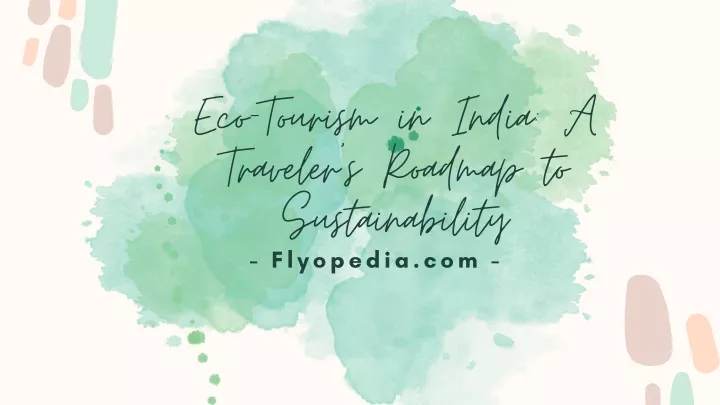
Eco-Tourism in India A Traveler’s Roadmap to Sustainability
Oct 16, 2023
0 likes | 7 Views
Unveil the secrets of eco-tourism in India through our traveler's roadmap. Immerse yourself in biodiversity hotspots, choose eco-friendly accommodations, and support local communities. This guide empowers you to be a conscious explorer, leaving behind a positive impact on the environment and the communities you encounter.
Share Presentation

Presentation Transcript
Eco-Tourism in India: A Traveler’s Roadmap to Sustainability - Flyopedia.com -
Choose Eco- Friendly Accommodations Key Points: Importance of choosing eco- friendly accommodations. Examples of sustainable practices in hotels and lodges. Tips for Travelers: Look for eco-certifications. Choose accommodations with waste reduction and energy conservation policies.
Explore National Parks and Wildlife Sanctuaries Key Points: Highlight the significance of national parks and wildlife sanctuaries. Encourage responsible wildlife tourism. Tips for Travelers: Follow ethical wildlife viewing practices. Support conservation efforts through entry fees.
Key Points: Importance of supporting local businesses. Encourage cultural exchanges and community engagement. Support Local Communities Tips for Travelers: Shop locally. Participate in community- based tourism activities.
Key Points: Importance of supporting local businesses. Encourage cultural exchanges and community engagement. Reduce Plastic Waste Tips for Travelers: Shop locally. Participate in community- based tourism activities.
Key Points: Encourage the use of low- impact transportation options. Discuss eco-friendly transportation alternatives. Choose Low- Impact Transportation Tips for Travelers: Opt for public transportation or shared rides. Consider walking or cycling for short distances.
Thank you for watching - Flyopedia.com -
- More by User
- Preferences

Sustainable Tourism in India - PowerPoint PPT Presentation

Sustainable Tourism in India
India's tourism sector has the potential to create jobs and stimulate local economies while preserving its environment. it also generates foreign exchange earnings and contributes to the country's gdp. the government is promoting sustainable tourism and aims to make the industry more environmentally friendly. the ministry is planning to develop a national strategy for sustainable tourism in the coming years and work with local communities, wildlife officials, and non-governmental organizations to promote responsible travel. – powerpoint ppt presentation.
PowerShow.com is a leading presentation sharing website. It has millions of presentations already uploaded and available with 1,000s more being uploaded by its users every day. Whatever your area of interest, here you’ll be able to find and view presentations you’ll love and possibly download. And, best of all, it is completely free and easy to use.
You might even have a presentation you’d like to share with others. If so, just upload it to PowerShow.com. We’ll convert it to an HTML5 slideshow that includes all the media types you’ve already added: audio, video, music, pictures, animations and transition effects. Then you can share it with your target audience as well as PowerShow.com’s millions of monthly visitors. And, again, it’s all free.
About the Developers
PowerShow.com is brought to you by CrystalGraphics , the award-winning developer and market-leading publisher of rich-media enhancement products for presentations. Our product offerings include millions of PowerPoint templates, diagrams, animated 3D characters and more.

- India’s Push for Sustainable Tourism

- Team India Blogs

World Tourism Day is celebrated every year to commemorate the foundation of the United Nations World Tourism Organization (UNWTO), a specialised agency of the United Nations which promotes responsible, sustainable, and universally accessible tourism. This year’s theme of World Tourism Day is Tourism and Green Investment, which highlights the need for more and better-targeted investments for People, for the Planet and for Prosperity, to enable tourism to deliver on its massive potential to provide opportunities for people, to build resilient, to accelerate climate action and greater sustainability for the planet and deliver inclusive prosperity around the pillars of innovation and entrepreneurship.
Tourism forms a critical part of India’s economy as it is a key driver of economic growth and job creation. The Ministry of Tourism’s India Tourism Statistics 2022 states that the Travel and Tourism sector created 79.86 Mn jobs, including direct and indirect ones. Moreover, 15.34% of the jobs created in 2019-2020 were in this sector. In terms of GDP, during 2019-2020, the tourism sector’s direct and indirect contribution was 5.19%. India’s ranking in the World Economic Forum’s Travel and Tourism Development Index (TTDI) is 54th in 2021.
In 2021, over 6.19 Mn foreign tourists travelled to India, fetching us foreign exchange earnings of $8.79 Bn, the 14th highest in the world. It is important to mention that during this period, tourism was among the worst-hit sectors due to the pandemic. It is estimated that India's Tourism Sector will achieve the pre-pandemic level of foreign exchange earnings of $30 Bn and 15 Mn foreign arrivals by mid-2024, totalling a $50 Bn GDP contribution from Tourism.
Further, it is estimated that India’s tourism sector will grow at 7-9% CAGR in the coming decade. By 2030, it will contribute $250 Bn — $56 Bn $ in foreign exchange earnings and 25 Mn foreign arrivals — to GDP, creating 137 million jobs.
The government is committed to realising the potential of the tourism sector sustainably to ensure that the tourist spots and wildlife-sensitive places are preserved for a long so that future generations also visit them. Toward this end, the government has taken various steps.
National Strategy for Sustainable Tourism was formulated by the Ministry of Tourism in 2022 to mainstream sustainability in the Indian tourism sector and ensure more resilient, inclusive, carbon-neutral and resource-efficient tourism while safeguarding natural and cultural resources. The comprehensive strategy document identified seven strategic pillars to make India a global destination for sustainable and responsible tourism: Promoting Environmental Sustainability; Protecting Biodiversity; Promoting Economic Sustainability; Promoting Socio-Cultural Sustainability; Scheme for Certification of Sustainable Tourism; IEC and Capacity Building; and Governance, and emphasised on the synergy between 16 ministries of the union government, state governments, local government institutions, industry, NGOs, local communities.
National Strategy for Ecotourism was drafted by the Ministry of Tourism in 2022 after considering the Ecotourism guidelines of the Ministry of Environment, Forest and Climate Change, the National Strategy for Rural Tourism, and the National Strategy Sustainable Tourism. It was designed to develop an enabling ecosystem for the growth of ecotourism in the country. The strategy emphasised creating synergies amongst the 8 ministries of the Central government, State Governments, Panchayati Raj Institutions, conservation NGOs and the private sector to develop ecotourism in the country. For the holistic development of the industry, the following pillars were identified: State Assessment and Ranking; State Strategy for Ecotourism; IEC, Capacity Building and Certification; Marketing and Promotion; Destination and Product Development; Public-Private and Community Partnerships; Governance and Institutional Framework. Among other steps, the strategy also envisaged ranking the States based on the globally recognised parameters of ecotourism. It will foster competitiveness and encourage mutual learning among all states.
Draft National Tourism Policy 2022 recognises tourism as a global opportunity for India and advocates sustainable and responsible growth of the tourism sector in the country. The main objective of the Policy is to make India a leading destination for sustainable and responsible tourism by minimising the negative impact of tourism on social, environmental, and economic aspects and maximising the positive impact. The Policy will act as a roadmap to achieve a $1 Trillion contribution of the tourism sector to GDP by the year 2047.
Travel for LiFE campaign was launched by the Ministry of Tourism in association with CNA-ST in 2021. The campaign aims to encourage the 300 Mn domestic tourists in India to shift towards responsible behaviour and mindful resource consumption while travelling.
Swadesh Darshan Scheme 2.0 was rolled out with the aim of developing sustainable and responsible tourism destinations in the country. The revamped scheme envisages enhancing the contribution of tourism to the local economies; Creating jobs, including self-employment for local communities; Enhancing the skills of local youth in tourism and hospitality; Increasing private sector investment in tourism and hospitality; and preserving and enhancing the local cultural and natural resources.
Sustainable Tourism for India Criteria and Indicators (STCI) aims to benchmark sustainable tourism practices for various tourism business enterprises, mainly accommodation units and tour operators, for STCI certification. The guidelines make it mandatory to ensure effective sustainable management, heritage protection, sharing social and economic benefits with the local community, conserving the environment, carrying capacity, and minimising negative impacts.
Policies of States: Various tourism-dependent states like Uttarakhand, Sikkim, and Himachal Pradesh have made policies to promote sustainable tourism while protecting rich biodiversity and natural wealth.
As illustrated above, the tourism sector in India has enormous potential as it is a multi-sectoral activity. The government is ambitiously promoting the industry to enable it to achieve $1 Trillion while ensuring that the pressure of tourists is within the country’s carrying capacity.
- https://www.unwto.org/world-tourism-day
- https://webunwto.s3.eu-west-1.amazonaws.com/s3fs-public/2023-03/concept-note-wtd2023-en.pdf?VersionId=El4TZl3a_WXt_K.Ujl2L0wrlQ2ZHE9k0
- https://static.pib.gov.in/WriteReadData/userfiles/IndiaTourismStatistics2022English.pdf
- https://tourism.gov.in/sites/default/files/2023-07/India%20Tourism%20Statistics%20at%20a%20glance%202023%20-%20English%20version_0.pdf
- https://pib.gov.in/PressReleaseIframePage.aspx?PRID=1860974
- https://tourism.gov.in/sites/default/files/2022-05/National%20Strategy%20for%20Sustainable%20tourism_0.pdf
- https://tourism.gov.in/sites/default/files/2022-09/Draft%20National%20Tourism%20Policy%202022%20Final%20July%2012.pdf
- http://sustainable.tourism.gov.in/Travel-for-LiFE-campaign.html
- https://tourism.gov.in/sites/default/files/2023-04/Swadesh%20Darshan%20%20Guideline%20Booklet.pdf
- http://sustainable.tourism.gov.in/images/pdf/Accomodation%20Units_Toolkit_31.03.2023.pdf
- https://tourism.gov.in/sites/default/files/2020-01/Document.pdf
We are India's national investment facilitation agency.

For further queries on this subject, please get in touch with us @Invest India. Raise your query

Ministry of Tourism launches the National Strategy for Sustainable Tourism and Responsible Traveller campaign Sustainable and responsible tourism practices will be implemented in various projects and initiatives through Swadesh Darshan 2.0 : Shri Arvind Singh
Ministry of Tourism, in partnership with United Environment Program (UNEP) and Responsible Tourism Society of India (RTSOI) organized National Summit on Developing Sustainable & Responsible Tourist Destinations today in New Delhi. On the occasion, the Ministry of Tourism launched the National Strategy for Sustainable Tourism and Responsible Traveller Campaign .
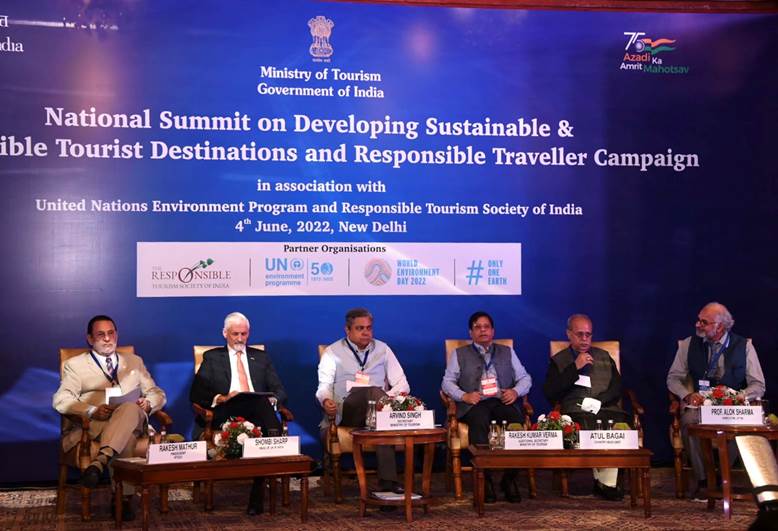
The Strategy document has identified the strategic pillars for development of sustainable tourism like Promoting Environmental Sustainability, Protecting Biodiversity, Promoting Economic Sustainability, Promoting Socio-Cultural Sustainability, Scheme for Certification of Sustainable Tourism, IEC and Capacity Building and Governance.
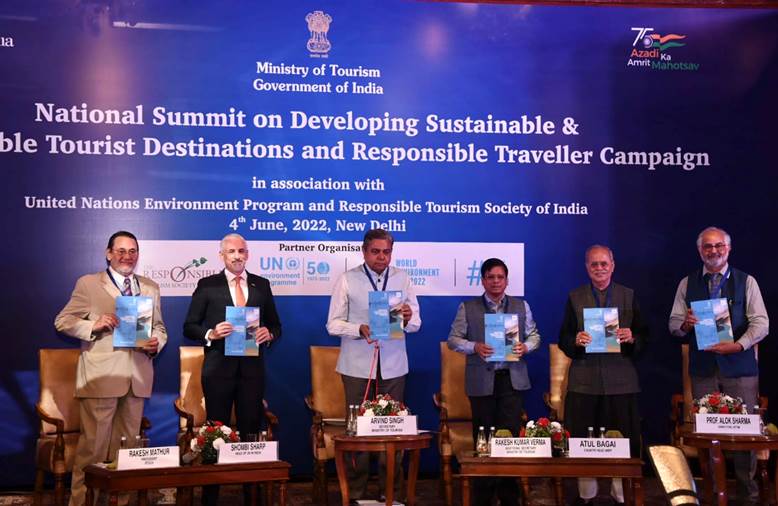
Speaking on the occasion Secretary Tourism Shri Arvind Singh said that Tourism and Environment share a Special Relationship. Their interaction with each other is a two-way process. On the one hand environmental resources constitute one of the basic ingredients of tourism. The natural and manmade setting form the tourism products which the tourist enjoys, live in, and relax. On the other hand, the close and direct relationship between visitors, host communities and local environment creates a sensitive situation, whereby tourism can be both very damaging but also very positive for sustainable development. The COVID-19 pandemic has further forced the tourism sector to shift its focus to resiliency, sustainability and interconnectedness among diverse stakeholders in the sector.
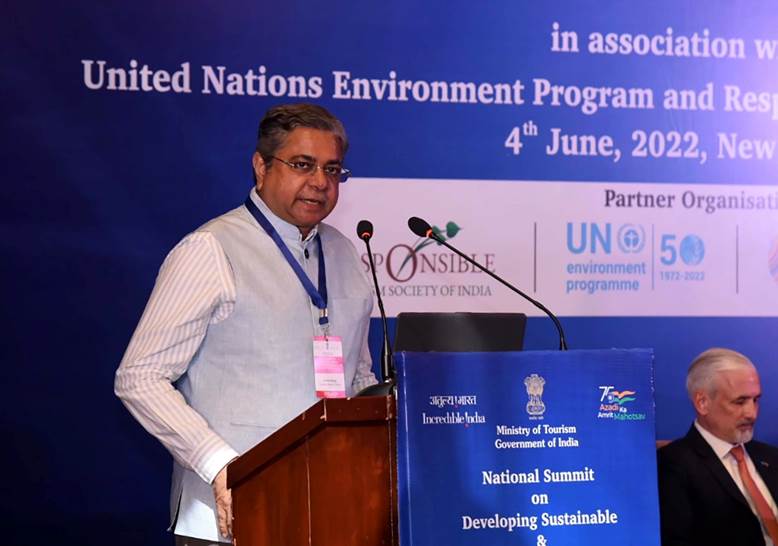
Shri Arvind Singh further said that we need to make use of cleaner fuels. Prime Minister has also announced that India will increase its capacity of non-fossil energy capacity to 500 GW and meet 50 per cent of its energy requirements through renewable energy by 2030. “State tourism policies should recognise sustainability principles and the Sustainable Development Goals in their vision and strategic direction for tourism. With the vision to create a sustainable future for tourism, the Ministry of Tourism has also taken various steps in this direction”, he added.
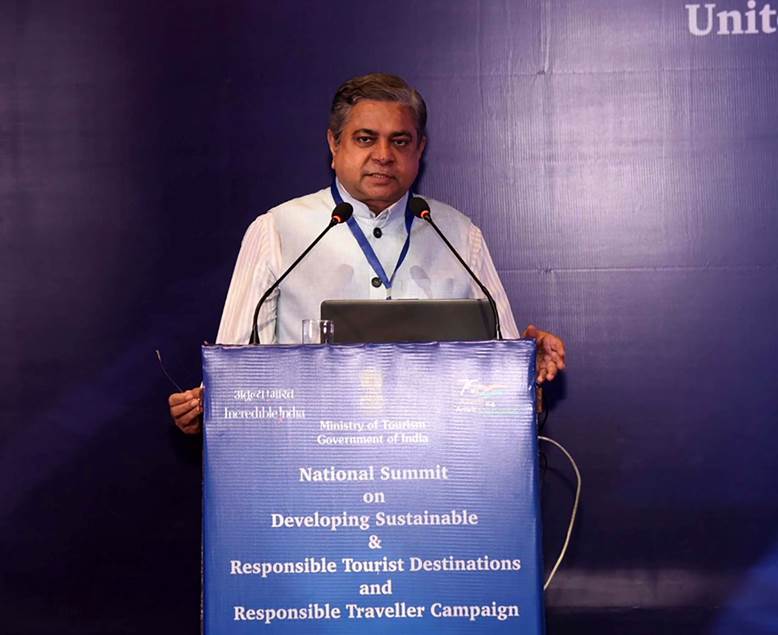
Shri Arvind said that Ministry of Tourism with the objective to provide experience to the tourists launched Swadesh Darshan Scheme and has till now sanctioned 76 Projects. With the learnings of this scheme, we have now revamped the Swadesh Darshan Scheme as Swadesh Darshan 2.0. “The idea of Swadesh Darshan 2.0 is to undertake holistic development with the vision to develop Sustainable and Responsible Tourist Destinations. While formulating the guidelines for SD 2.0 we have kept various elements in mind in order to undertake destination development in a sustainable and responsible manner.Through the Swadesh Darshan 2.0 sustainable and responsible tourism practices will be implemented in various projects and initiatives. The Scheme will encourage adoption of principles of sustainable tourism including environmental, socio-cultural and economic sustainability”, he added.
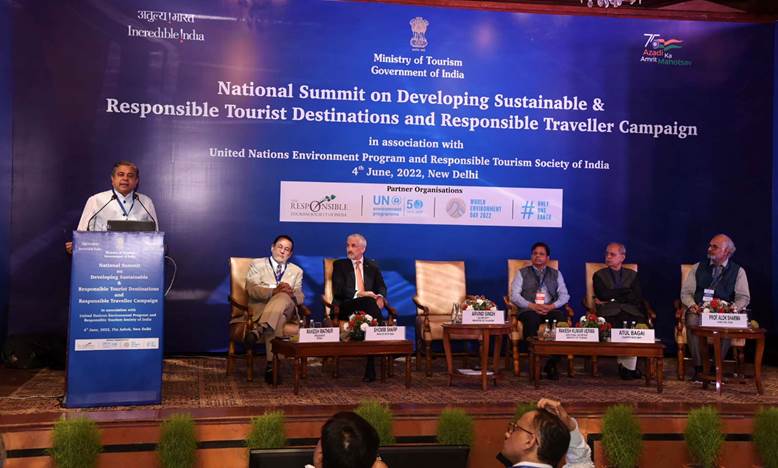
Apart from Shri Arvind Singh, Secretary, Ministry of Tourism, Mr Shombi Sharp, Head of UN in India and Shri Rakesh Mathur, President, RTSOI, various eminent Speakers working in the field of Sustainable Tourism & Responsible Travel and from State Governments addressed the participants in different sessions during the One Day National Summit. The Summit was attended by senior officers of different Central Ministries, State Governments/UT Administrations and various Tourism & Hospitality Industry Associations.
A Pledge was also administered by Shri Arvind Singh,Secretary, Ministry of Tourism to the participants to become responsible travellers and be advocates of responsible tourism.
*******

VIDEO
COMMENTS
The report provides a comprehensive analysis of sustainable tourism in India, outlining the impact of the COVID-19 pandemic on tourism, the recovery trajectory, and the strategic focus on sustainable tourism. It highlights the necessity for integrating sustainability across all tourism activities to ensure the sector's resilience and ...
20 Sustainable Tourism Practices and Destinations in India. Spiti Valley, Himachal Pradesh: Nestled in the Himalayas, Spiti Valley is a remote and pristine destination that offers travelers a chance to experience the unique culture and traditions of the Spiti people. The valley is home to several eco-tourism initiatives, such as the Spiti ...
Tourism has been included as targets in Goals 8, 12 and 14 on inclusive and sustainable economic growth, sustainable consumption and production and the sustainable use of oceans and marine resources, respectively. Tourism, however, has the potential to contribute, directly or indirectly, to all of the sustainable development goals.
The impact of tourism on the Indian economy. Travel and tourism accounts for about 5% of GDP in India, generating 39 million jobs as of 2020. By 2029, the WTTC predicts that India will be among the top 10 countries in the world with the largest GDP from tourism. Ashley at the Taj Mahal by Ashley Blake.
mechanisms through which the Ministry of Tourism may promote eco-friendly practices in the new post COVID-19 world. 1. Creation of a sustainable tourism fund • The fund is likely to provide capital incentives, loans and grants to the various players in the travel and tourism sector that adopt more sustainable measures
Explore the heart of India sustainably with our traveler's roadmap to eco-tourism. Uncover breathtaking biodiversity hotspots, engage with local communities, and choose eco-friendly accommodations. This roadmap is your key to a responsible and unforgettable journey, leaving behind only cherished memories. - A free PowerPoint PPT presentation (displayed as an HTML5 slide show) on PowerShow ...
Home | Ministry of Tourism | Government of India
Eco-Tourism in India: A Traveler's Roadmap to Sustainability - Flyopedia.com -. Choose Eco-Friendly Accommodations Key Points: Importance of choosing eco- friendly accommodations.Examples of sustainable practices in hotels and lodges. Tips for Travelers: Look for eco-certifications. Choose accommodations with waste reduction and energy conservation policies.
India's tourism sector has the potential to create jobs and stimulate local economies while preserving its environment. It also generates foreign exchange earnings and contributes to the country's GDP. The government is promoting sustainable tourism and aims to make the industry more environmentally friendly. The ministry is planning to develop a National Strategy for Sustainable Tourism in ...
It is estimated that India's Tourism Sector will achieve the pre-pandemic level of foreign exchange earnings of $30 Bn and 15 Mn foreign arrivals by mid-2024, totalling a $50 Bn GDP contribution from Tourism. Further, it is estimated that India's tourism sector will grow at 7-9% CAGR in the coming decade. By 2030, it will contribute $250 Bn ...
3. Sustainable Tourism Scenario. Tourism is one economic sector in India that has the potential to grow at a high rate and ensure the development of infrastructure at the destinations. It has the capacity to capitalize on the country's success in the services sector and provide sustainable models of growth.
2.3. Growth drivers for cultural sustainable tourism and digital transformations. India is one of the very few countries which enjoys such a diversified Culture, weather, geographical presence. If we go with the facts, India's tourism Industry is the third largest foreign exchange earner after garments, jewelry and gems.
Kerala is the first state in India that has been conferred upon the top United Nations Award, UNWTO Ulysses Award for Innovation in Public Policy and Governance, the highest honor given to government bodies for shaping global leadership and creating innovative initiatives for sustainable tourism. Located in the southwestern coast of the country, bordered by the Arabian Sea on the west and ...
"Incredible India" at WTM 2023 was not only a presentation of India's tourist offerings but also a celebration of sustainable and responsible tourism, culture, and community engagement. India Tourism at WTM 2023. The Indian Delegation to WTM from 6-8 November 2023 is headed by Ms. V. Vidyavathi, Secretary, Ministry of Tourism, Government of India.
Kerala is well known for its eco-tourism initiatives, beautiful backwaters, and unique culture and traditions. Kerala is also unique due to its fascinating geographic diversity compared to other Indian states. Thus, Kerala offers a range of tourist attractions and experiences, as noted by Edward & George (2008).
The Scheme will encourage adoption of principles of sustainable tourism including environmental, socio-cultural and economic sustainability", he added. Apart from Shri Arvind Singh, Secretary, Ministry of Tourism, Mr Shombi Sharp, Head of UN in India and Shri Rakesh Mathur, President, RTSOI, various eminent Speakers working in the field of ...
Contributing to the protection, preservation, and enhancement of local places and traditions is. one of the most important and sometimes overlooked parts of sustainable tourism. These. include ...